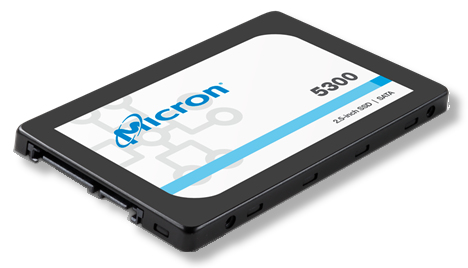 LENOVO SSD 5300 960GB 2.5in SATA 6Gb ThinkSystem Mainstream Hot Swap
LENOVO SSD 5300 960GB 2.5in SATA 6Gb ThinkSystem Mainstream Hot Swap
For personal help or faster delivery
+32 2 558 30 00
Abstract
The ThinkSystem 5300 Mainstream SATA 6Gb solid-state drives (SSDs) use Micron NAND flash memory technology with a SATA 6Gbps interface to provide an affordable solution for mixed read/write workloads.
This product guide provides essential presales information to understand the 5300 Mainstream SSD offerings, their key features and specifications, components and options, and configuration guidelines. This guide is intended for technical specialists, sales specialists, sales engineers, IT architects, and other IT professionals who want to learn more about the SSDs and consider their use in IT solutions.
Change History
Changes in the January 7 update:
- Added SR850P to the server support table (no support) - Server support section
Introduction
The ThinkSystem 5300 Mainstream SATA 6Gb solid-state drives (SSDs) use Micron 96-layer 3D NAND flash memory technology with a 6Gbps SATA interface. They provide an affordable solution for mixed read/write applications such as cache in transactional applications and high-speed storage for enterprise databases.
SSDs have a huge but finite number of program/erase (P/E) cycles, which affect how long they can perform write operations and thus their life expectancy. Mainstream SSDs typically have a better cost per read IOPS ratio but lower endurance and performance compared to Performance SSDs. SSD write endurance is typically measured by the number of program/erase cycles that the drive can incur over its lifetime, which is listed as total bytes written (TBW) in the device specification.
The TBW value that is assigned to a solid-state device is the total bytes of written data that a drive can be guaranteed to complete. Reaching this limit does not cause the drive to immediately fail; the TBW simply denotes the maximum number of writes that can be guaranteed. A solid-state device does not fail upon reaching the specified TBW. However, at some point after surpassing the TBW value (and based on manufacturing variance margins), the drive reaches the end-of-life point, at which time the drive goes into read-only mode. Because of such behavior, careful planning must be done to use SSDs in the application environments to ensure that the TBW of the drive is not exceeded before the required life expectancy.
For example, the 5300 Mainstream 1.92 TB drive has an endurance of 17,520 TB of total bytes written (TBW). This means that for full operation over five years, write workload must be limited to no more than 9,600 GB of writes per day, which is equivalent to 5.0 full drive writes per day (DWPD). For the device to last three years, the drive write workload must be limited to no more than 16,000 GB of writes per day, which is equivalent to 8.3 full drive writes per day.

















 FREE Shipping.
FREE Shipping.

